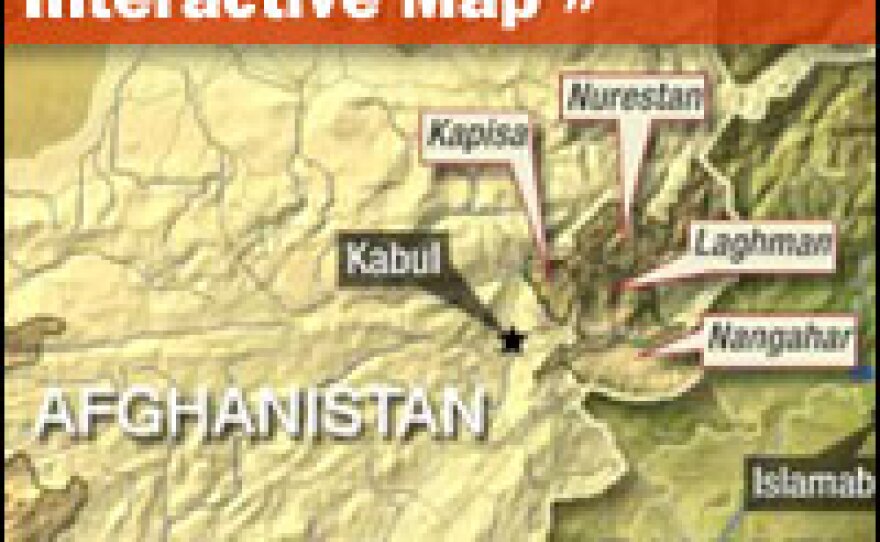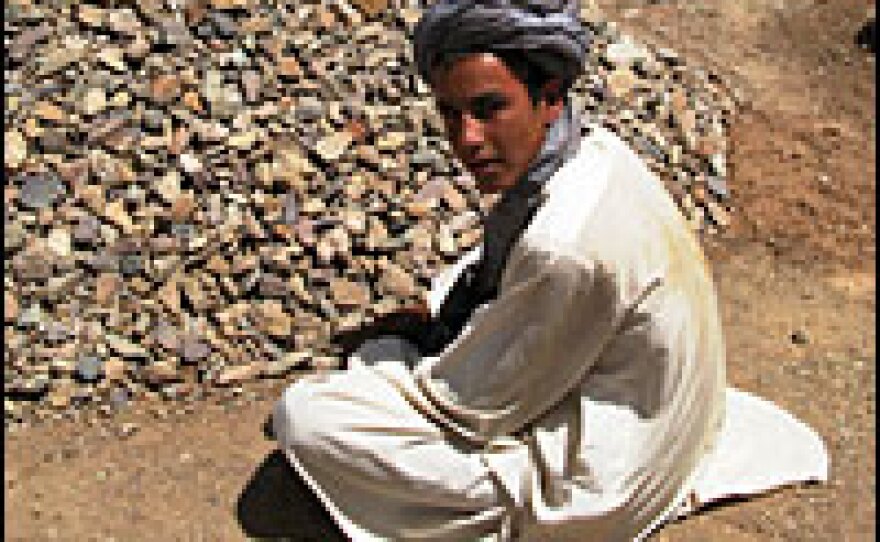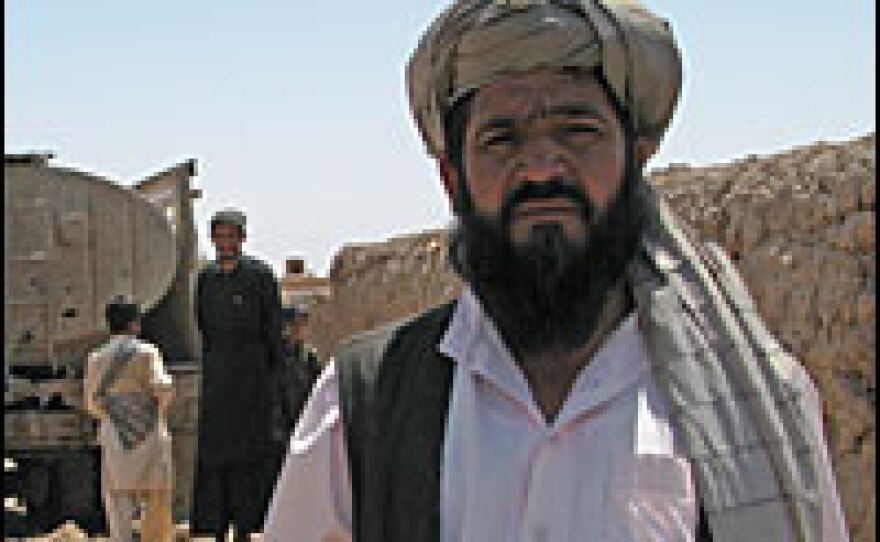


Evidence is mounting that some 90 Afghan civilians, many of them children, were killed last week in a joint U.S.-Afghan operation against the Taliban in the western part of the country.
It is the third time this summer the U.S. military has been accused of killing large numbers of innocent Afghans. This latest attack was by far the worst.
Now, President Hamid Karzai's government is considering scaling back Western military activities in the country, but it is not the Americans whom the survivors want punished.
The Attack On Azizabad
Abdul Rashid treads gently across the rubble that was once his uncle's home in Azizabad, Afghanistan. He spots a little girl's shoe, caked in dried blood. He picks it up and waves it angrily in a visitor's face.
"Does this look like it fits a Taliban fighter?" Rashid says. Still clinging to the tiny shoe, Rashid takes a few more steps and picks up a torn woman's veil.
"Does this look like something the Taliban would wear? Can you believe it? This is what Afghanistan has become," Rashid says, his rage dissolving into tears.
The tribal elder says he doesn't know how to help his clan come to terms with the attack by U.S. and Afghan forces on his village last Friday. He pages through a handwritten report that lists the names and ages of 91 dead, most of them relatives.
Sixty were children, and at least 15 more were women, say U.N. and Afghan officials, who have gone to Azizabad to investigate the incident.
Rashid says the latest victim, a 6-year-old girl, was buried the day before.
Afghan officials say Rashid's neighborhood, which was the target of the military operation, was packed with visitors the morning of the attack. They were there to attend a memorial ceremony honoring his late brother, a local strongman.
Rashid says vats of meat, rice and potatoes were being prepared for the scores of mourners when the soldiers attacked.
The U.S. Response
The U.S. military maintains it was going after a legitimate Taliban target. It says it killed 30 people, all but five of them insurgents. It says it has also launched an investigation into the incident and will answer no further questions until that probe is complete.
Qader Rahimi, the regional director of Afghanistan's human rights commission, believes that U.S. and Afghan forces received bad intelligence ahead of the Azizabad raid. His independent group is one of many investigating the tragedy.
"While women and children are killed, it means there have not been very accurate measurements for the operations," Rahimi says.
A senior Afghan official, who also has investigated the attack, provided more details. He asked not to be identified or taped for fear of losing his job.
He says U.S. troops and Afghan commandos from the nearby Shindand military base conducted the pre-dawn operation. They did not inform local authorities of their plans. The troops were acting on a tip that a Taliban commander was in the village and had gathered a group of fighters in his home.
The official says the same tipster then alerted the Taliban to the planned operation, so when the soldiers arrived, they came under fire from as many as 15 gunmen. The troops fired back and called for an airstrike. The official says most of the gunmen managed to flee.
So, it appears, did the Taliban commander, despite American and Afghan military claims that he was killed.
The Accountability Factor
To date, the tipster has not been charged. The only people held responsible were two senior Afghan officials linked to the operation. President Hamid Karzai fired them this week.
His government also paid families the equivalent of $2,000 for each victim to compensate them for their loss.
In Kabul, Karzai's Cabinet is demanding that agreements with foreign forces here be renegotiated. The idea, officials say, is to stop operations not coordinated with the Afghan government and to curb the growing number of airstrikes.
But one influential Afghan lawmaker says Karzai is wrong to focus his ire on the American and Afghan militaries. Helaludin Helal says instead, the government should work on improving its intelligence gathering and share that information with Western forces. The Americans, in turn, must coordinate with Afghan authorities before they launch operations.
He says that this way, both can better identify the enemy and avoid tragedies like the one in Azizabad.
"The foreign forces don't have good intelligence here," Helal says. "So it's no surprise that when they are attacked, they hit back hard. They don't know if there's one or 100 insurgents firing at them."
Human rights activist Rahimi says that time is running out for the Western forces to get it right.
"As I know my people in Afghanistan, they will forgive the first time, maybe they will forgive second time, third time, fourth time," Rahimi says. "But we should not expect that all the time they will forgive. Maybe some day they'll be angry, and they'll react."
Creating New Enemies?
Taliban spokesman Zabiullah Mujahed says many are already reacting by joining the insurgency.
"The more the Americans oppress the people, the greater the Afghan desire for revenge," Mujahed says. "The Americans may have created more than 1,000 new enemies in Herat province."
Such figures are impossible to verify, but the unnamed Afghan official says it is clear there are more insurgents in this area now than there were a year ago.
In Azizabad, where grief hangs like a thick curtain, many survivors say they no longer support their government or the Americans, but tribal elder Rashid says the only retribution they seek is against the tipster.
Still, he acknowledges it is hard to persuade people not to take out their frustration on the government — like when residents recently threw stones at Afghan police trucks bringing in food and supplies.
On this day, there's no violence — only tears. Multan, 15, weeps at his brother-in-law's grave. Multan says the dead man had just married his sister two weeks ago.
Nearby, a 27-year-old policeman named Daoud wanders around in a tearful daze. He clings to a tattered piece of black cloth. It's part of the outfit he says his youngest daughter had on when she was killed, along with her five siblings and his wife.
Daoud says he was at a highway checkpoint far away when the soldiers and war planes came.
Now, he doesn't know what he'll do. But he says one thing is for sure — he's quitting the force. He says he can no longer protect his country, not after his country failed to protect his family.
Copyright 2022 NPR. To see more, visit https://www.npr.org. 9(MDAzMjM2NDYzMDEyMzc1Njk5NjAxNzY3OQ001))






